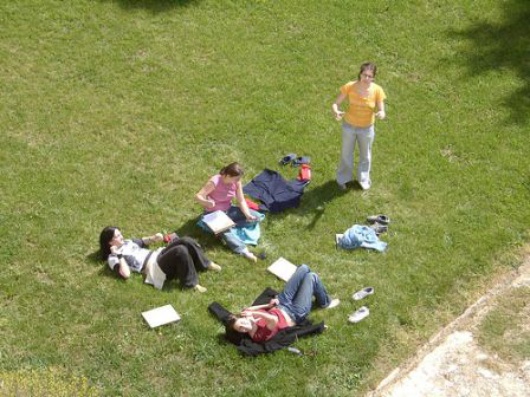
Three tips to move out and see Europe
Published on
The European Union is trying to do everything to motivate the youngsters with mellow personality to move them out from their usual environment and to get the to know with new cultures. Our parents are green with envy, because nowadays there are a lot of possibilities for us to gain new experiences abroad.
We collected the three most popular EU co-financed programs which are aiming to mobilize the European youth.
It’s not just about learning - Image: Flickr.com/ju2citron
ERASMUS: a half year long party or even an internship
Who is studying in a collage or in an university I compulsorily recommend to participate a half or even a full-year abroad. The main essence of the program is that higher education institutions are concluding agreements with each other and after that undergraduates can compete for places offered by the partner institution to study there for a semester or a year. The EU gives 2-300 euros aid depending on the place of the education. The place can be crucial, because even within a country there can be huge differences.
For example the French country can be relatively cheap compared with Paris, but the Western countryside is still very expansive compared with Krakow. From the EU aid in Poland you can almost survive but not in Western Europe. The competition practice shows that the sending institutions are usually flexible and although high language knowledge is recommended there are examples which show that students went to Spain to learn while they couldn’t even ask for a glass of beer in Spanish.
The Erasmus-internships are published twice a year and it is possible to apply for different places at the same time. But of course only one destination is possible. The number of the applicants is depending on the institution or on the faculty, there are universities where it is very high and there are faculties where the number of the applicants is less than the available places. Every university has its own Erasmus coordinator who can help you with the paperwork, and if you are lucky he or she knows a lot about the program.
I was also an Erasmus-student and I can only tell you the same that everybody tells you, anyone who goes out with Erasmus will become a party animal at least for a half year.
But there is something which is not known widely. There are possibilities to apply for a tune-up two-week-long intensive language course, which is also financed by the EU. As for internships there are also available founds in the Erasmus program for student who would like to do their compulsory internship abroad. The application procedure is a bit different because in this case the applicant must do a bit more paperwork and you must find a company which would employ you. More information can be found at this homepage.
LEONARDO: for the vocational students who would like to learn abroad
This program is not as well-known mainly because the number of the possible participants are limited compared to the Erasmus program. Who are vocational students? Mainly those who are learning in an institution after secondary school but not in an university or a collage. The main goal, on the basis of the mobility, is to help the students to get them to know how their profession is exercised abroad. The duration of the practices are between 2 to 39 weeks and can be done in most of the countries in Europe not just in the members of the EU. Leonardo program also gives financial assistance for the students and the weekly available cash depends on the duration of the practice and also on the host country. If you are interested in the program you can find more information in your school or in this link.
 Informal way of learning (Image: Flickr/dcgiuk)
Informal way of learning (Image: Flickr/dcgiuk)
European Voluntary Service (EVS): the experiment is priceless
The EU is also thinking for those who are not learning right now or they are postponing their studies for a year and they would like to work as a volunteer. Who is a volunteer? A volunteer is a person who is working in a non-profit organization for 30-35 hours in a week for a very symbolical salary. In EVS there is an organization called receiver organization which is going to employ the volunteer and will guarantee accommodation, food and language learning and they will cover the travel cost including the plane ticket and the local transportation. The salary which is more than a pocket money is approximately 80-120 euros per month.
Who is applying for this program knows well that it is not about the money it is about gaining experience and to get to know new cultures. The available activities have a quite wide range. From culture to sport, from social care to environment protection, from art to cultural heritage there are quite lot activities to choose from.
How can you apply? There are databases where you can search by country, by the activity or by the duration. Most of the programs are at least half year long mainly because a volunteer needs at least 2-3 months to fill into the new environment. Of course there are exceptions: right now a Bulgarian organization is searching for volunteers only for one month to organize the local Balkan Festival. So, if you have successfully found a nice project where you would like to participate you need to find a sending organization, which will help you with the paperwork.
In Hungary the Budapest based Cseresznye Egyesület (Cherry Organization in Hungarian language) can help you to answer all your questions. In the projects former experiment is not needed, your future boss would like you to be open minded and flexible. The application process takes quite long so that you have to plan 6 month in average in advance from applying till the arriving. If you are lucky and you are chosen you will also participate in a preparation training where you will get advices for your future life abroad. The sending organization will stay in contact with you all the way 24/7 if you need help they will be there for you, well at least virtually.



